DORA Regulation: Bafin Digital Operational Resilience Act
We discussed BaFin's implementation of the Digital Operational Resilience Act (DORA), focusing on cyber incident reporting in the financial sector. The conversation covered the act's impact, streamlined processes, and BaFin's role in enhancing cybersecurity and regulatory compliance.

DORA Regulation: BaFin Enhancement for Better Cyber Resilience in the Financial Sector
Germany's Federal Financial Supervisory Authority (BaFin) has recently enhanced its online presence with a comprehensive section dedicated to the Digital Operational Resilience Act (DORA). This update, effective since October 2023, aims to assist regulated entities in understanding and complying with this crucial European Union legislation.
- A significant focus of the updated content is on the management of ICT third-party service providers.
- BaFin emphasizes the importance of robust oversight to ensure operational resilience, offering practical advice for effective relationship management in compliance with the new regulations.
- Guidelines for Identifying Critical Service Providers:
- Clear guidelines are provided for financial firms to identify critical service providers, a key component of DORA.
- This information is crucial for determining which ICT service providers require closer management and oversight under the new act.
- Reporting ICT Incidents:
- The website outlines guidelines for reporting ICT incidents promptly and accurately.
- Timely incident reporting is highlighted as a vital practice for maintaining the integrity of the financial sector, particularly against cyber threats and disruptions.
- BaFin's Pivotal Role:
- BaFin's role in the implementation and enforcement of DORA in Germany is pivotal.
- The updated online resources reflect BaFin's commitment to guiding financial institutions through the complexities of DORA, ensuring they meet regulatory obligations effectively.
- Contributing to European Financial System Resilience:
- Beyond mere compliance, BaFin's initiative plays a significant role in fortifying the European financial system against emerging digital risks.
- The comprehensive guidance provided aids financial institutions in navigating the evolving landscape securely.
In essence, BaFin's online resources serve as a comprehensive guide, equipping financial institutions with the knowledge needed to navigate DORA effectively. From practical advice on third-party service providers to incident reporting guidelines, BaFin's commitment to ensuring compliance and fortifying the financial sector against digital risks is evident in its detailed and accessible online resources.
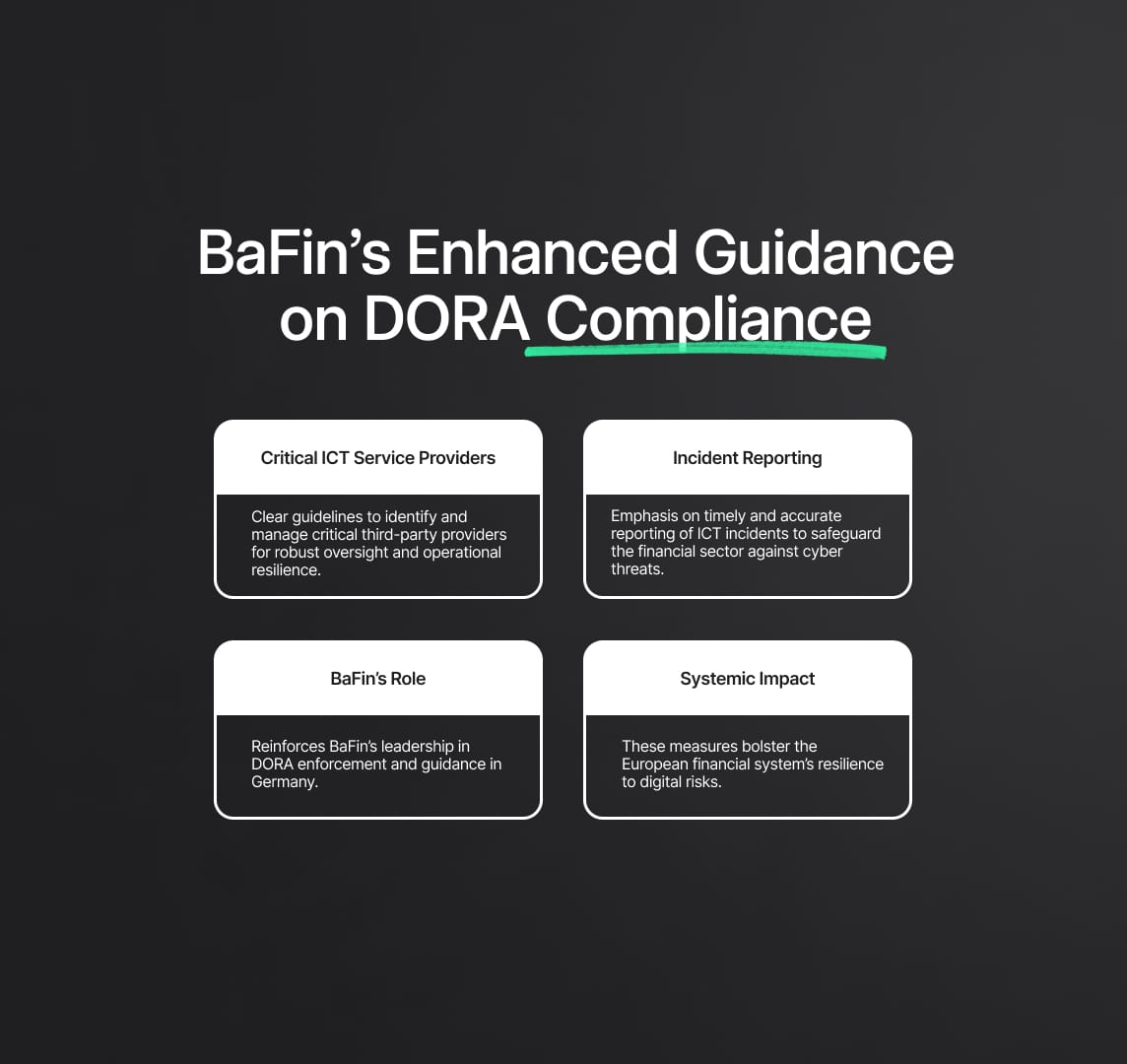
Introduction to DORA's Impact on Financial Cybersecurity
The Digital Operational Resilience Act (DORA), a pivotal piece of European Union legislation, has gained significant attention with the recent update by Germany's Federal Financial Supervisory Authority (BaFin). Implemented in October 2023, DORA represents a landmark step in the EU’s efforts to bolster cybersecurity within the financial sector. BaFin’s enhancement of its online resources to include detailed information on DORA signals a strong commitment to guiding financial institutions through the complexities of digital resilience and regulatory compliance.
Amidst the escalating reliance on digital technologies and the surging wave of cyber threats, the introduction of DORA comes as a timely and crucial move. This regulation emphasizes the necessity for a unified strategy in addressing these challenges across the EU. Focused on operational resilience, DORA not only prepares financial entities to handle cyber incidents but aims to equip them to prevent such incidents altogether.
- Harmonized Approach to Cyber Challenges:
- DORA's introduction addresses the growing reliance on digital technologies in financial systems.
- It underscores the need for a harmonized approach across the EU to effectively manage the rising tide of cyber threats.
- Operational Resilience as a Priority:
- DORA places a significant focus on operational resilience, ensuring that financial entities are prepared to handle and, importantly, prevent cyber incidents.
- The regulation recognizes the evolving landscape and aims to fortify financial systems against potential disruptions.
- BaFin's Role as a Critical Resource:
- The BaFin website has emerged as a critical resource for financial entities navigating the complexities of DORA.
- Offering comprehensive guidance and clarity on compliance requirements, it serves as a go-to platform for those seeking to align their practices with the new regulation.
- Proactive Strategy and Foresight in Cybersecurity:
The BaFin website has emerged as a critical resource for financial entities navigating the complexities of DORA.
- The BaFin website has emerged as a critical resource for financial entities navigating the complexities of DORA.
- Offering comprehensive guidance and clarity on compliance requirements, it serves as a go-to platform for those seeking to align their practices with the new regulation.
In essence, BaFin's commitment to providing a comprehensive resource for DORA compliance reflects a forward-thinking approach to cybersecurity. As financial entities grapple with the digital landscape's challenges, BaFin's proactive measures align with the regulatory shift towards preventive strategies, reinforcing the resilience of financial systems against the growing threat of cyber incidents
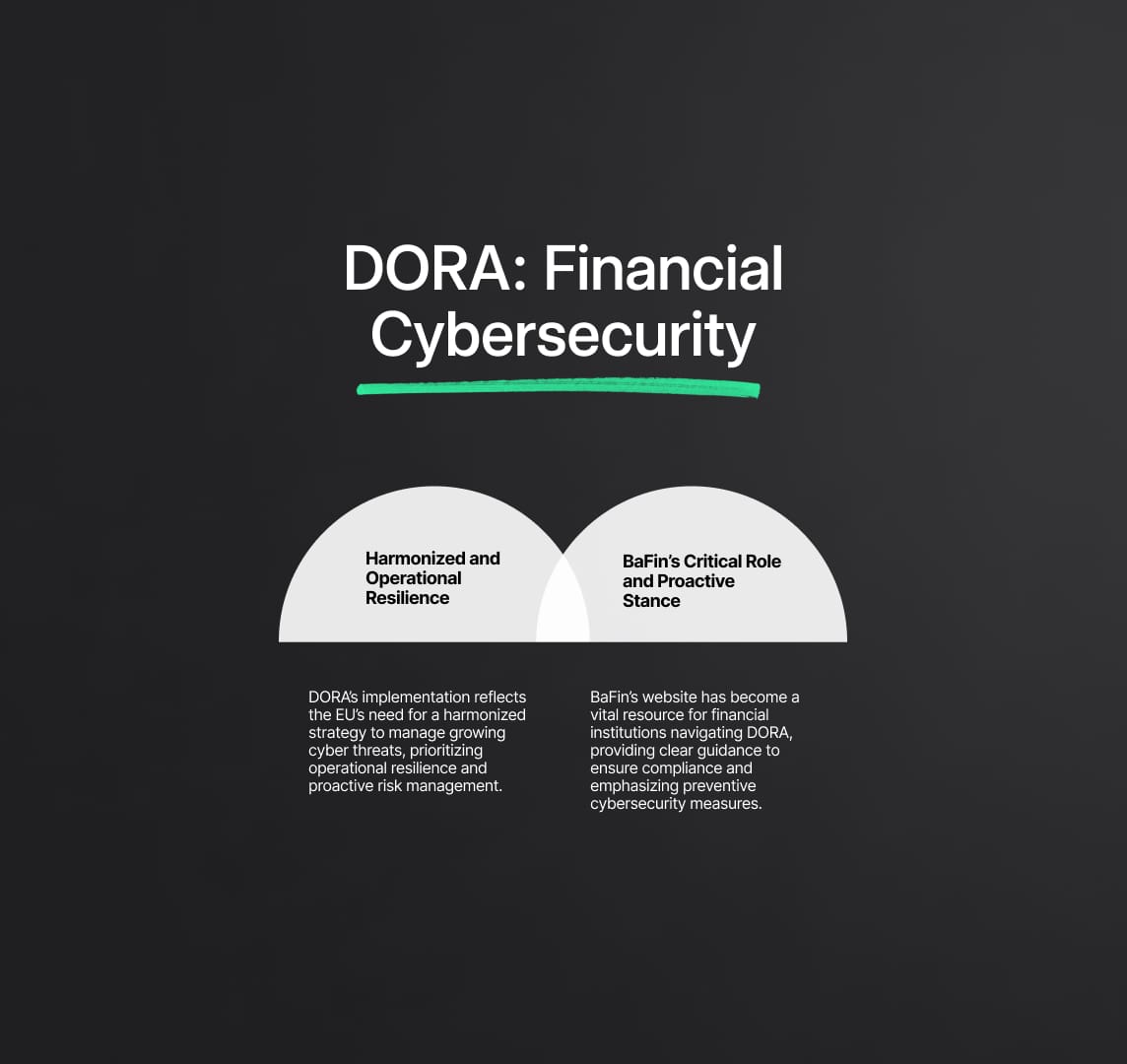
DORA's Role in Financial Sector Regulation
The Digital Operational Resilience Act (DORA) marks a transformative shift in the regulatory framework of the European Union's financial sector. BaFin, Germany's Federal Financial Supervisory Authority, has developed a dedicated section on DORA, serving as a comprehensive resource for a wide array of financial entities. This initiative is instrumental in steering the sector towards greater digital operational resilience, a critical need in the face of evolving cyber threats.
Target Audience for DORA Resources:
- Banks: Offering tailored guidance for traditional banking institutions adapting to digital challenges.
- Investment Firms: Assisting these entities in integrating robust digital resilience strategies.
- Insurance Companies: Providing specialized resources for insurance providers to navigate digital operational risks.
- Other Financial Services Providers: Addressing the needs of a diverse range of financial institutions.
The importance of DORA lies in its emphasis on resilience amidst digital disruptions. It signifies the European Union's dedication to bolstering the stability and reliability of its financial systems in a rapidly digitizing world. By mandating stringent requirements for digital operational resilience, DORA reflects an acute awareness of the increasing cyber threats and the necessity for a harmonized response across the EU.
BaFin’s role in the implementation and enforcement of DORA is crucial. It shapes the practices and strategies of financial entities, driving them towards a more proactive stance in managing digital risks. The aim is to create a robust regulatory environment where compliance is seamlessly integrated with strategies to mitigate digital vulnerabilities.
Impact of DORA on Financial Institutions:
- Enhanced Digital Resilience: Encouraging institutions to develop stronger defenses against cyber threats.
- Proactive Risk Management: Promoting the adoption of forward-looking risk management strategies.
- Regulatory Compliance: Ensuring adherence to the highest standards of digital operational security.
DORA stands as a testament to the EU's progressive approach to financial regulation, aiming to safeguard the sector against the challenges posed by technological advancements. Its focus extends beyond mere regulatory compliance, fostering a culture of resilience and adaptability that is essential for the future of the financial industry.
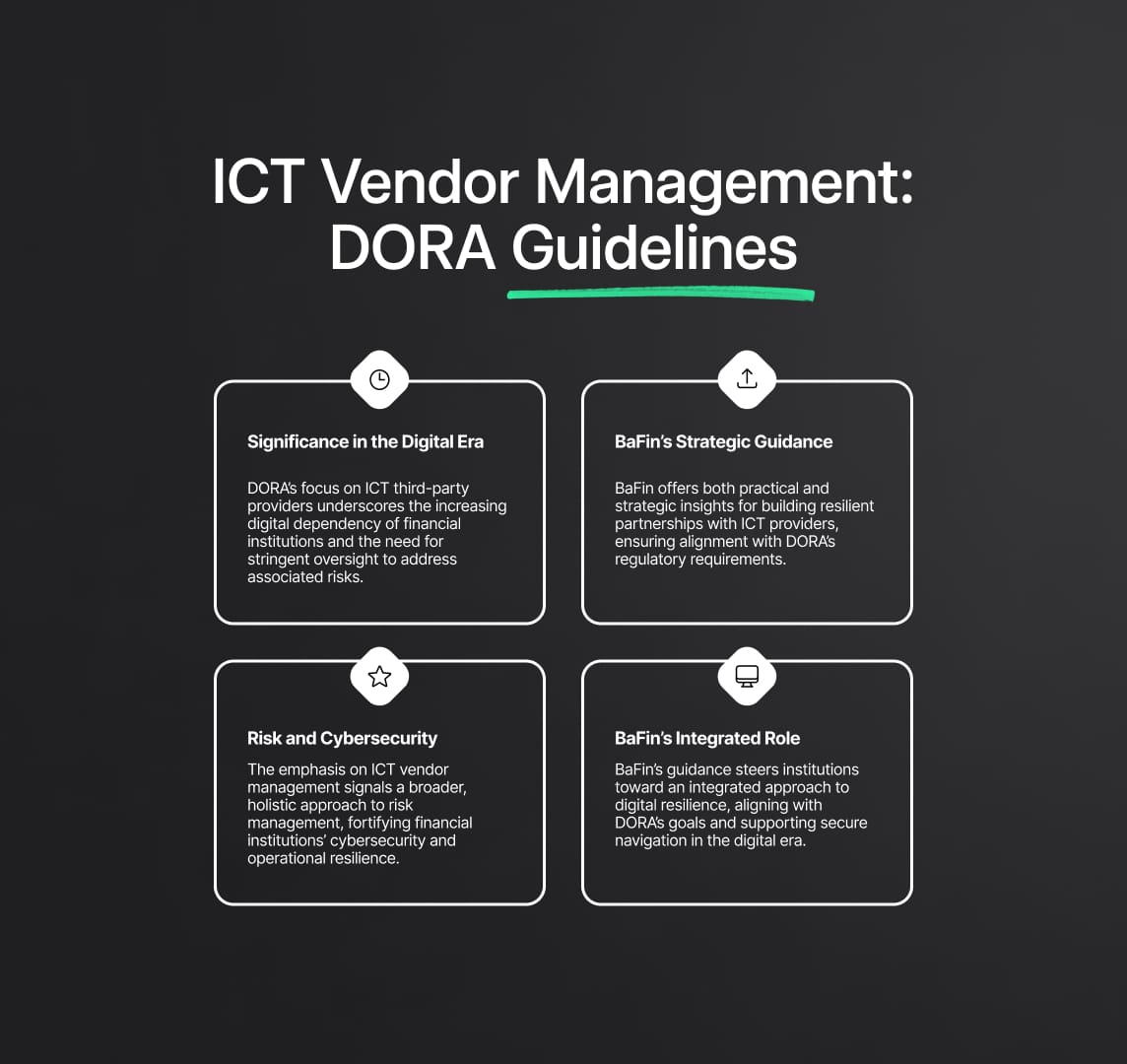
Strengthening ICT Vendor Management with DORA Guidelines
The Digital Operational Resilience Act (DORA) places a critical spotlight on the management of ICT third-party service providers, underscoring their pivotal role in maintaining operational resilience for financial institutions. BaFin's guidelines within the DORA framework offer a robust and comprehensive framework, empowering financial entities to elevate their oversight and control over these external service providers.
- Significance in the Digital Era:
- DORA's emphasis on ICT third-party service providers gains significance in the context of the escalating dependency of financial institutions on digital technologies.
- The corresponding risks associated with third-party vendors heighten the importance of stringent oversight, aligning with the evolving digital landscape.
- Practical and Strategic Insights:
- BaFin's resources provide not only practical but also strategic insights into establishing robust management protocols for ICT providers.
- The guidance is crafted to assist financial institutions in building resilient partnerships with technology providers, ensuring alignment with DORA's stringent regulatory requirements.
- Holistic Approach to Risk Management:
- The focus on ICT vendor management under DORA reflects a broader trend in financial regulation.
- There is an emphasis on a holistic approach to risk management, with DORA mandating rigorous oversight to minimize vulnerabilities arising from external digital dependencies.
- Fortifying Cybersecurity Posture:
- DORA's approach is instrumental in fortifying the overall cybersecurity posture of financial entities, safeguarding operational resilience from potential compromises due to third-party risks.
- By addressing these vulnerabilities, DORA contributes to the resilience of financial institutions in the face of evolving digital threats.
- Integrated and Strategic Approach:
- Through its guidelines, BaFin effectively steers financial institutions toward a more integrated and strategic approach to digital operational resilience.
- This alignment with the overarching objectives of DORA showcases BaFin's commitment to ensuring financial entities navigate the complexities of the digital era securely.
In essence, the convergence of DORA, the critical role of ICT third-party service providers, and BaFin's strategic guidance sets a new standard in risk management within the financial sector. By fostering resilient partnerships and addressing digital dependencies, financial institutions are better equipped to navigate the evolving digital landscape while adhering to the stringent regulatory landscape outlined by DORA.
Criteria for Identifying Critical ICT Service Providers under DORA
Under the Digital Operational Resilience Act (DORA), the identification of critical Information and Communication Technology (ICT) service providers emerges as a focal point for financial institutions. Compliance with DORA's stringent regulations hinges on how effectively these institutions can manage their external digital service providers. The Federal Financial Supervisory Authority (BaFin) provides a clear and comprehensive framework, guiding financial entities in categorising and effectively managing their ICT service providers. This process is essential for maintaining and enhancing operational resilience within the financial sector.
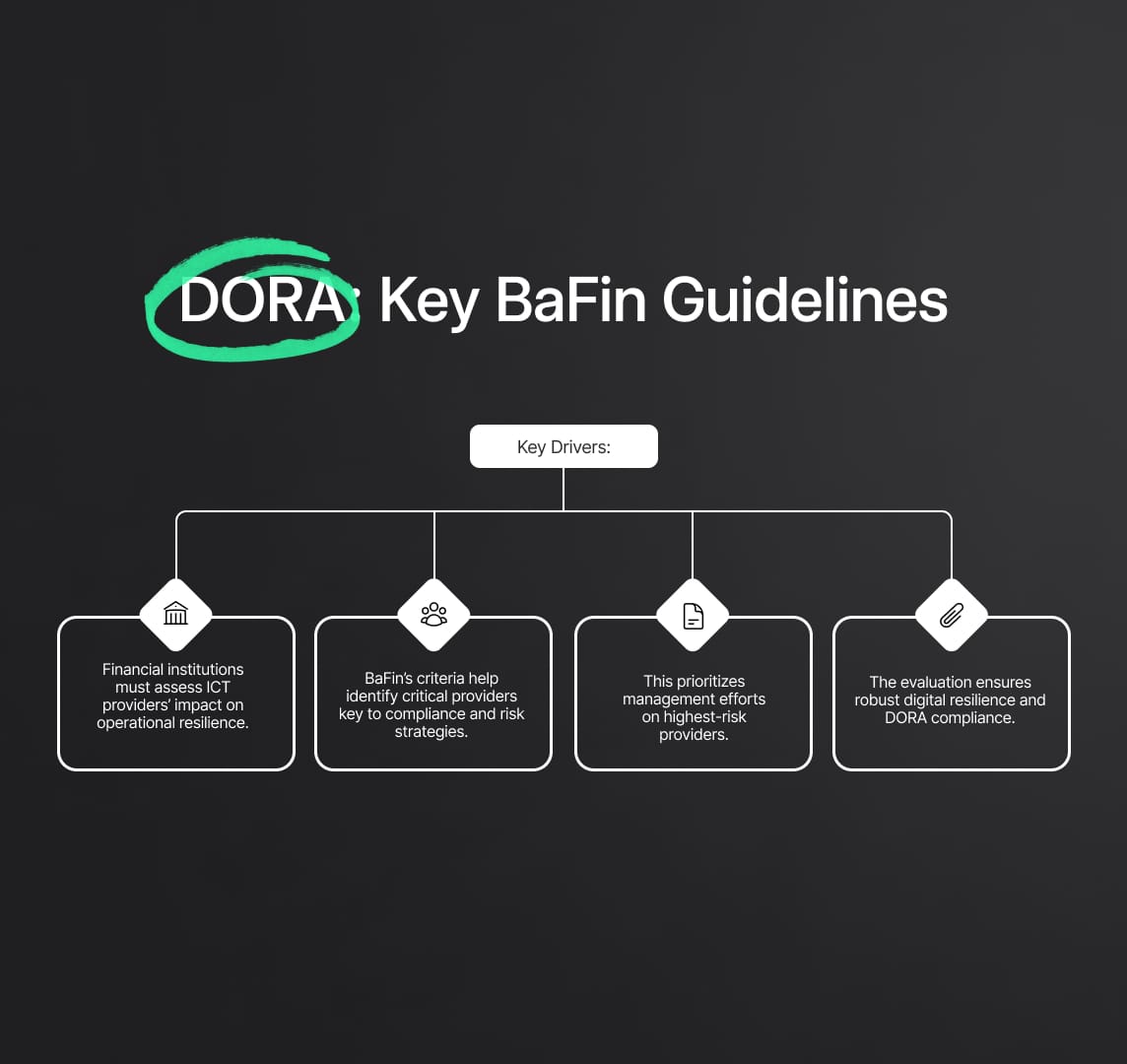
Key aspects of BaFin’s guidelines under DORA include:
- Assessment of Provider Criticality: Financial institutions are required to evaluate the importance of each ICT service provider in relation to their overall operational resilience. This involves a thorough analysis of how integral each service provider is to the institution's core functions and services.
- Identification of Integral Providers: BaFin's criteria assist financial firms in pinpointing which ICT service providers are essential to their operations. This step is crucial for understanding the potential impact of these providers on the institution’s regulatory compliance and risk management strategies.
- Implications for Regulatory Compliance and Risk Management: The process aids in comprehending how these ICT service provider relationships impact the institution's compliance with regulatory standards and its approach to managing digital risks.
- Prioritization of Management Efforts: With the identification of critical service providers, financial institutions can strategically prioritize their management efforts. This focus is particularly directed towards those providers that present the highest risk to operational stability.
- Comprehensive Digital Resilience Strategy: Recognizing the importance of ICT service providers in the wider context of digital resilience, this step is integral to developing a robust strategy that encompasses all aspects of digital operations and risks.
- Actionable and Clear Criteria from BaFin: The criteria provided by BaFin are not only clear but also actionable, enabling financial entities to make informed decisions regarding their ICT partnerships.
- Alignment with DORA's Operational Resilience Standards: Ensuring that these ICT service provider relationships align with DORA's high standards of operational resilience is key. This alignment is crucial for safeguarding financial entities against potential disruptions and cyber risks.
The focus on identifying critical ICT service providers as part of DORA’s regulations underscores the evolving nature of digital risks within the financial sector. BaFin’s guidelines empower financial institutions to navigate these complexities, ensuring that their ICT partnerships are managed in a way that fortifies their operational resilience and compliance with DORA. This proactive approach is vital in safeguarding the financial sector against the backdrop of increasing digital interconnectivity and the corresponding cyber threats.
Streamlining Cyber Incident Reporting under DORA
BaFin’s guidance under the Digital Operational Resilience Act (DORA) regarding the reporting of ICT incidents is a cornerstone in bolstering the cyber resilience of the financial sector. The processes outlined for incident reporting, mandated by DORA, are meticulously designed to ensure prompt and precise communication of cyber threats and disruptions. This is a key aspect of DORA, playing a vital role in establishing a responsive and proactive cybersecurity environment within the financial sector.
By implementing standardised reporting protocols, BaFin's initiative aims to enable a more efficient and effective response to cyber incidents. This approach is multi-faceted, enhancing not only the immediate handling of such events but also contributing significantly to the broader objective of understanding and mitigating cyber risks over the long term.
Key features of this streamlined incident reporting process include:
- Timely Communication: Ensuring rapid reporting of cyber incidents to minimise impact.
- Accuracy and Precision: Detailed and accurate incident descriptions for better understanding and response.
- Standardized Protocols: Uniform reporting procedures across the financial sector.
- Efficiency in Reporting: Simplifying the reporting process for quick and effective implementation.
- Proactive Cybersecurity Measures: Encouraging a forward-thinking approach to handling cyber threats.
The emphasis on incident reporting under DORA highlights an acute awareness of the evolving and dynamic nature of cyber threats, needing for a coordinated and agile response. BaFin, serving as the central reporting hub for ICT incidents under DORA, simplifies the reporting process for financial institutions. This centralization enables institutions to concentrate more on immediate response and recovery measures, rather than getting entangled in complex reporting procedures.
This streamlined process is instrumental in fostering a culture of transparency and vigilance within the financial sector. It ensures that institutions are not merely reactive in handling cyber incidents but are also well-equipped to learn from these events and improve their cybersecurity measures. In essence, the streamlined incident reporting process under DORA plays a crucial role in reinforcing the overall resilience of the financial sector, equipping it to effectively counter emerging cyber risks and adapt to the digital landscape’s evolving challenges.
By enhancing the incident reporting process under DORA, BaFin is setting a new standard in cybersecurity management within the financial sector, marking a significant step towards a safer and more resilient financial ecosystem.
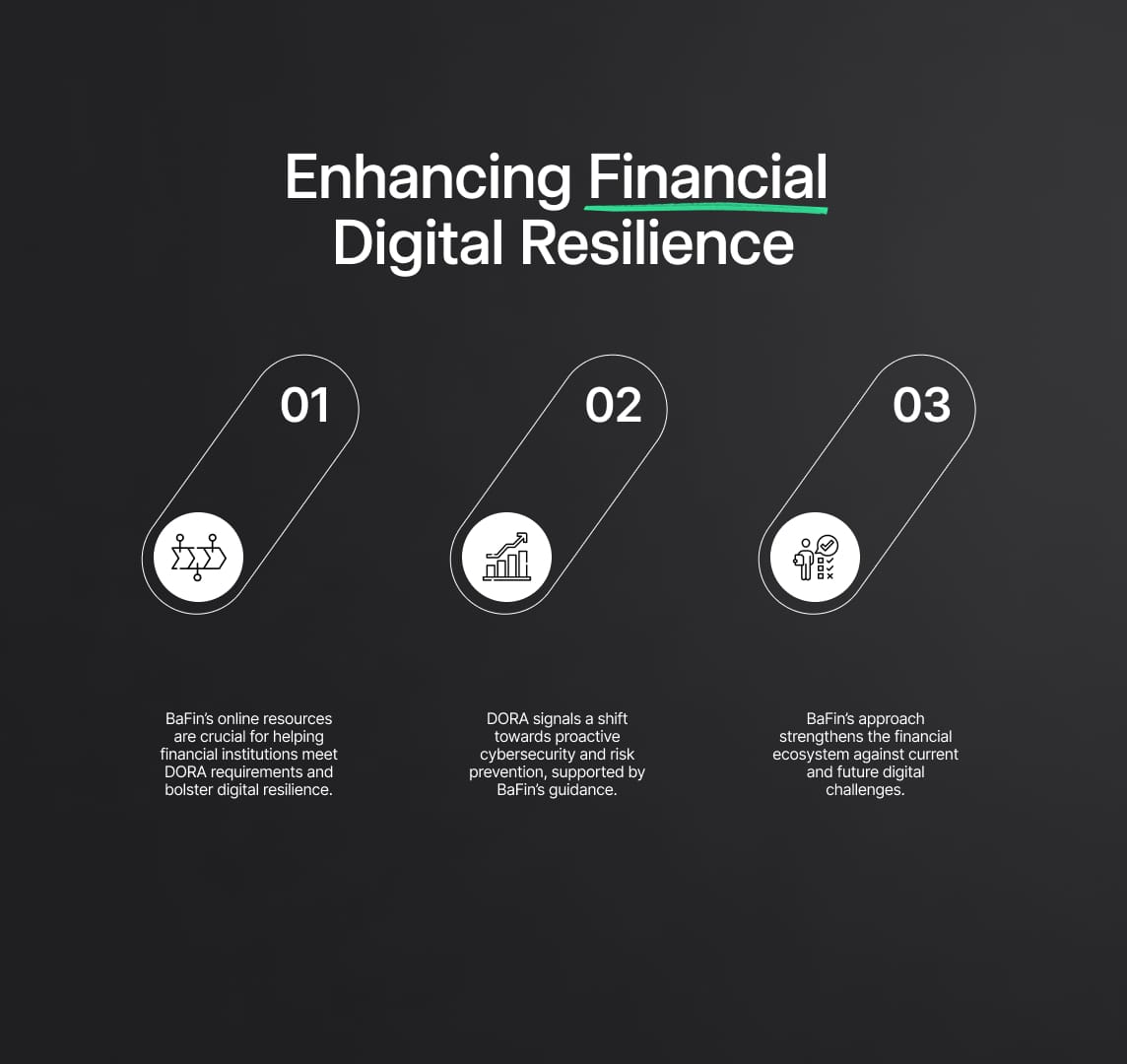
Enhancing Compliance and Digital Resilience in the Financial Sector
BaFin's dedicated commitment to guiding financial institutions through the complexities of the Digital Operational Resilience Act (DORA) exemplifies a proactive approach to regulatory compliance and digital risk management. This initiative is paramount in assisting institutions to meet the rigorous regulatory requirements established by DORA. The focus on compliance extends beyond mere rule adherence, encompassing a comprehensive strategy to elevate the digital resilience of the financial sector.
- Crucial Role of BaFin's Online Resources:
- BaFin's online resources and guidance are pivotal in this endeavor, offering financial institutions the essential tools and knowledge to navigate the intricate landscape of digital operational resilience.
- These resources empower institutions to align with DORA's requirements and fortify their digital defenses.
- Shift Towards Preventive Measures:
- The emphasis on DORA reflects a broader shift in the regulatory paradigm, where the spotlight is increasingly on preventive measures and strategic planning to counter digital vulnerabilities.
- BaFin's efforts contribute significantly to this proactive approach, fostering a resilient financial ecosystem capable of withstanding the challenges posed by the ever-evolving digital landscape.
- Instrumental in Creating a Robust Ecosystem:
- BaFin's proactive stance in implementing DORA plays a pivotal role in creating a robust and resilient financial ecosystem.
- This ecosystem is not only capable of meeting current regulatory demands but is also prepared to adapt to future digital disruptions.
- Preparation for Future Digital Challenges:
- The proactive approach ensures that financial institutions are not only compliant with the existing regulatory framework but are also well-prepared for future digital disruptions.
- DORA serves as a cornerstone in the EU's broader efforts to safeguard the financial sector, fostering a culture of resilience and adaptability crucial in the face of escalating cyber threats.
In essence, BaFin's proactive role in guiding financial institutions through DORA underscores a commitment to building a future-ready financial landscape. By instilling a culture of resilience and adaptability, BaFin contributes significantly to the overarching goals of DORA and reinforces the financial sector's ability to navigate the complexities of the digital era securely.
Read More

Reduce your
compliance risks


